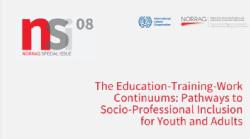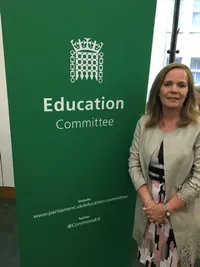IER News & blogs
Disconnection in the education-training-work-continuum
 Dr Jamelia Harris published an article as part of the NORRAG Special Issue NSI 08 : The Education-Training-Work Continuums: Pathways to SocioProfessional Inclusion for Youth and Adults.
Dr Jamelia Harris published an article as part of the NORRAG Special Issue NSI 08 : The Education-Training-Work Continuums: Pathways to SocioProfessional Inclusion for Youth and Adults.
The Special Issue is part of a collaboration with the ILO and focuses on the discontinuities that currently exist between education, training and decent work, arguing that existing discontinuities between these three fields create and reinforce exclusions and inequalities for already marginalised groups.
How can skill systems in Europe reduce the level of skills mismatch in labour markets?
IER's Professor Terence Hogarth has successfully secured Horizon Europe funding for his project Skills2Capability. The project is about understanding how skill systems across Europe can reduce the level of skills mismatch in their labour markets.
Education Select Committee Inquiry: Purpose and quality of education

Dr Deirdre Hughes OBE, IER's Principal Research Fellow,was invited by the Chair of the Education Select Committee to facilitate a breakout session on the theme of 'Employability and Functional Skills' at their conference on 14 September. More than 100 guests attended a series of breakout sessions, during which a number of subjects arising through the Committee’s inquiryLink opens in a new window were discussed. These included primary and secondary assessment, parental engagement, social mobility in education, employability and functional skills, standards, behaviour and discipline, educating outdoors, expressive arts and creativity, and wellbeing and mindfulness.The conference finished with a keynote speech from academic and broadcaster Professor Mary Beard.
More information on the Education Select Committee ConferenceLink opens in a new window.
Report on Improving career prospects for the low-educated
The narrative study led by Professor Jenny Bimrose with colleagues from IER and partners in the Czech Republic, Denmark, Germany, France, Italy and Poland has been published by Cedefop who commissioned the research.
The report draws both on literature review and an original collection of stories from biographical interviews of individuals from seven European countries. The narrative accounts describe the wide variety of experiences with initial and further education. The analysis focuses on motivations for learning (or not) and the findings confirm that early negative experiences with schooling have a scarring effect inhibiting workers’ willingness to re-engage in education later in life. Nevertheless, many low-educated adults were found to command a variety of skills, which they have developed in the work context.
IER's Lynn Gambin to provide evidence on Apprenticeships to Committee on Education, Skills and the Economy
Lynn Gambin has been invited to provide evidence to the Select Committee on Education, Skills and the Economy for their inquiry into apprenticeships and the 'skills gap'. Lynn will appear before the committee along with other academic experts, apprenticeship training providers and the National Union of Students on 8th June at 2pm. For more information on the Committee's Inquiry and the evidence session, see http://www.parliament.uk/business/committees/committees-a-z/commons-select/education-skills-and-economy/news-parliament-2015/apprenticeships-evidence-16-17/
Previously, Lynn served as Specialist Adviser to the Education Select Committee on its inquiry into Apprenticeships and Traineeships for 16-19 year old (see the Committee's report here).
